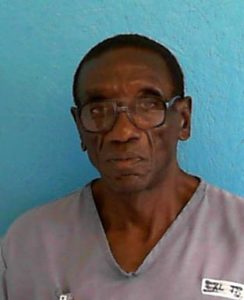Sheriff Anthony Wickersham stated he is 100 percent satisfied with how his officers handled a recent situation in his jail. Although he concedes during an interview that a hospital is located about three minutes away, he is also of the opinion that the baby born on a jail cell floor came too fast. He goes on to talk about how nice it would be to have a medical team on hand, but adds that the taxpayers would have to pay for that. He also says he is not going to second guess the decisions of his staff.
I am.
Jessica Preston was pulled over for driving on a suspended license. She was given a court date five days later and ordered to pay a $10,000 cash bond, but she couldn’t afford it, so she was to stay in jail until she could see the judge. If she had been wealthy, she would not have been in the jail. But, she wasn’t wealthy, so in the jail she stayed.
Ms. Preston was eight months pregnant at the time she was jailed. She had delivered her first baby via an emergency C-section and was scheduled to deliver Elijha the same way for health reasons.
It was while she was at the jail that Jessica’s contractions began. Her baby was coming a month early, she was behind bars, and she was experiencing the pain of labor.
At 7 in the morning, she sought medical attention and made the staff aware she was having her baby. They didn’t allow her to go to a hospital, but instead sent her back to her cell.
Four and half hours later, at 11:30, she again sought medical assistance, letting staff know she was having a baby. Again, Jessica was sent back to a jail cell.
At 1:00 in the afternoon she tried again, this time with blood running down her leg. Rather than call an ambulance, the staff sent her back to her cell.
Elijha was born at 2:45 that day. Almost two hours after the last attempt Jessica made to get help.
The Sherriff may want to cloud the issues with talk about taxpayers needing to pay for medical staff, budgets, etc, but by doing so, he is just making it all the more apparent how far many of those employed in corrections will go to cover for each other’s poor treatment of inmates.
When a pregnant woman starts to have a baby, you help her. It’s that simple. Wickersham said they didn’t have time – they had time. They had well over seven hours to get that woman to a hospital. Seven hours. It takes less than a minute to call an ambulance.
In the spectrum of morally right and wrong – which is worse? Driving on a suspended license, or not offering assistance to a young woman who is in labor for over seven hours and endangering the life of a premature baby? Which leads to one more question. Which is worse – not allowing a woman access to a doctor when she goes into labor a month early, or trying to defend the inexcusable lack of compassion and professionalism that led to a child being born on a jail cell floor?
REFERENCES
Hutchinson, Kevin Dietz Derick. “Macomb County Sheriff Stands by Staff after Woman Forced to Give Birth in Jail Cell.” WDIV. N.p., 10 Feb. 2017. Web. 28 Mar. 2017.
Kevin Dietz, Frank McGeorge, Derick Hutchinson. “Major Health Risks for Woman Who Delivered Baby on Cell Floor at Macomb County Jail.” WDIV. N.p., 07 Feb. 2017. Web. 28 Mar. 2017.
Schladebeck, Jessica. “Pregnant Woman Forced to Deliver Baby on Jail Cell Floor.”NY Daily News. N.p., 07 Feb. 2017. Web. 28 Mar. 2017.
![]()
 Travion Blount was fifteen years old when he got in trouble. Described as a ‘shy but happy boy’ by his mother, in middle school he started skipping class and hanging out with the wrong crowd. At the age of fifteen he went to a party with two older boys, and the three of them robbed the other people there at gunpoint, collecting drugs, cell phones and money.
Travion Blount was fifteen years old when he got in trouble. Described as a ‘shy but happy boy’ by his mother, in middle school he started skipping class and hanging out with the wrong crowd. At the age of fifteen he went to a party with two older boys, and the three of them robbed the other people there at gunpoint, collecting drugs, cell phones and money. When people try to tell me I can find a better ‘cause’ than criminal justice reform, it only punctuates how much need there is for education. This is just one story. This story and the countless like it are why this is my cause.
When people try to tell me I can find a better ‘cause’ than criminal justice reform, it only punctuates how much need there is for education. This is just one story. This story and the countless like it are why this is my cause. Oscar Giles was born in 1949. That would make him almost seventy years old today. I look at his photo, and I see such sadness. There is loneliness in those eyes too. What I don’t see is menace. Just weary defeat.
Oscar Giles was born in 1949. That would make him almost seventy years old today. I look at his photo, and I see such sadness. There is loneliness in those eyes too. What I don’t see is menace. Just weary defeat.